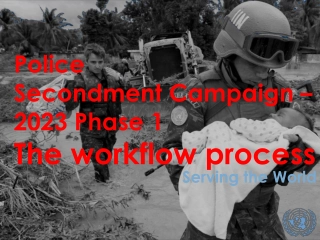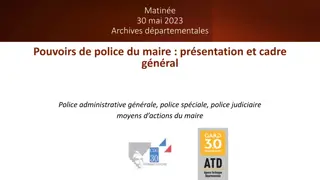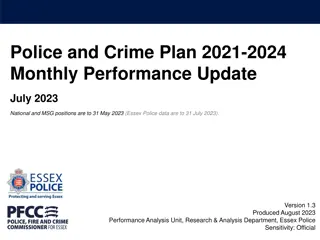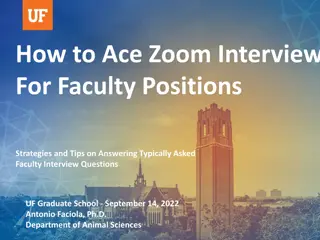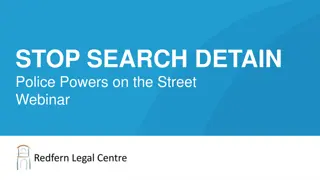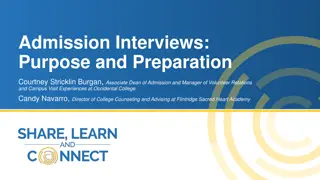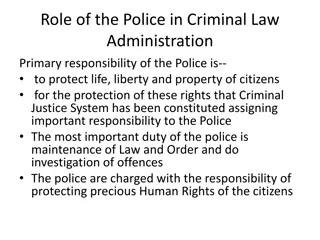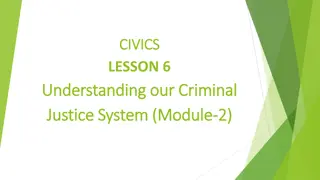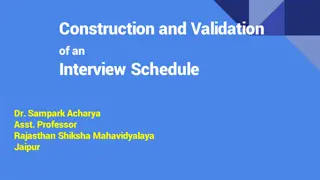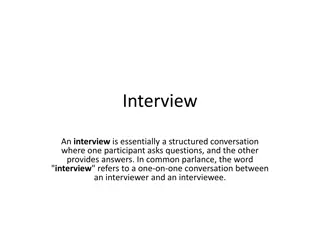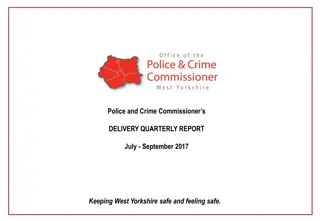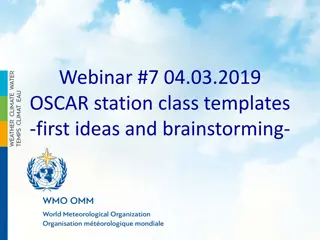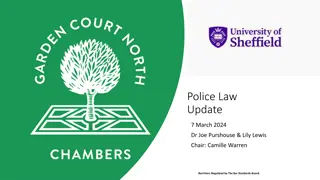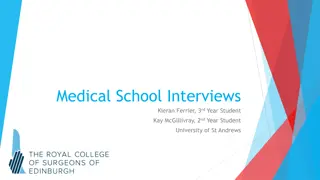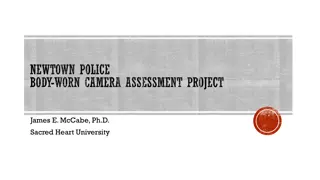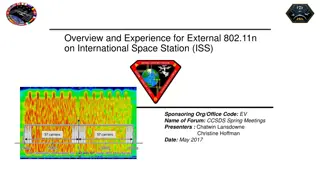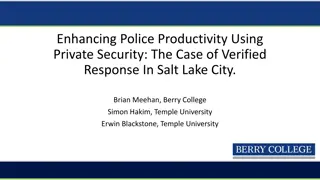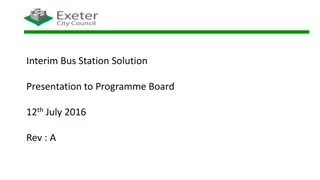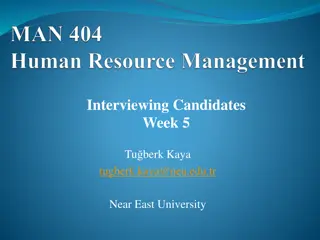Understanding Police Station Interviews and the Importance of Effective Communication
Police station interviews present complex decisions for defendants, with options including no comment, prepared statement, or full comment. Explore the impact on trials and the role of legislation such as PACE Code C. Learn from expert barristers about the practical realities and legal guidelines governing police interviews. Effective communication and understanding rights are key in navigating this critical stage of criminal proceedings.
Download Presentation

Please find below an Image/Link to download the presentation.
The content on the website is provided AS IS for your information and personal use only. It may not be sold, licensed, or shared on other websites without obtaining consent from the author. Download presentation by click this link. If you encounter any issues during the download, it is possible that the publisher has removed the file from their server.
E N D
Presentation Transcript
Police Station Interviews; To Speak Police Station Interviews; To Speak Or Not To Speak, That Is The Or Not To Speak, That Is The Question Webinar Question Webinar 26 January 2021
Presenters Rebecca Filletti | Barrister | Garden Court North Chambers Rebecca specialises in criminal defence and has acted as counsel to defendants accused of the most serious criminal offences including murder, manslaughter, rape, historic sexual allegations, child cruelty, drug offences, fraud and offences relating to serious violence and firearms. To view Rebecca s full bio, please click HERE. Zara Walker | Barrister | Garden Court North Chambers Zara predominantly practices in the area of criminal law. She also accepts instructions in other areas which complement her criminal practice, including International Human Rights and International Criminal Law, Prison Law and Inquest work. To view Zara s full bio, please clickHERE.
Agenda We will: a) go through the various options at the police station; b) consider the pros and cons of each approach; c) consider how a particular approach could impact upon a defendant s trial; and d) provide some closing thoughts.
Police Station Interviews The reality is that there is no right answer; hindsight is a wonderful thing, each case will depend on the case and the defendant. We are more than aware of the competing interests at the police station stage. Our experience is also that counsel often don t appreciate the practical realities of the decision making process that has to be undertaken, at speed, at the police station. Exacerbated by current circumstances when many police interviews are taking place with representatives on the end of the phone, unable to view CCTV etc.
The Options 1. No comment. 2. Prepared statement. 3. Full comment.
Legislation / Codes ( Interviews) PACE Code C (2019), PACE Code E (2018) and PACE Code F (2018) govern how police conduct interviews. We do not intend to go through this guidance in any detail. Of Note is PACE Code C, Code 11.1A which sates: Before a person is interviewed, they and, if they are represented, their solicitor must be given sufficient information to enable them to understand the nature of any such offence, and why they are suspected of committing it (see paragraphs 3.4(a) and 10.3), in order to allow for the effective exercise of the rights of the defence.
Sufficient Information Guidance note 11ZA states that sufficient information: should normally include, as a minimum, a description of the facts relating to the suspected offence that are known to the officer, including the time and place in question. This aims to avoid suspects being confused or unclear about what they are supposed to have done and to help an innocent suspect to clear the matter up more quickly.
Sufficient Info (cont) Sufficient information is a very broad term in practice. But ultimately the amount of pre-interview disclosure and the detail within it will often inform the best option.
Silence and Adverse Inferences Perhaps the greatest concern with silence in interview (no comment) is the prospect of an adverse inference at trial (per Section 34 of the Criminal Justice and Public Order Act (CJPOA) 1994) Section 34 allows an inference to be drawn if: a suspect is silent when questioned under caution prior to charge and, subsequently relies upon a relevant fact at Court, which he or she could reasonably have been expected to mention when questioned. It is the failure to rely on a fact that a defendant is now relying on at trial, not the failure to answer questions per se, that can give rise to an inference. An adverse inference direction can arise in all situations no comment, prepared statement or a full comment interview. Of course, it is more likely to arise in the first two.
Silence and Adverse Inferences Just because a suspect declines to answer questions, does not automatically mean that an adverse inference can be drawn. It is only when he or she later seeks to put forward an account or explanation that the adverse inference provision is triggered. Adverse inferences are not appropriate when the Crown is put to proof as no facts have been relied upon (per Moshaid [1998] Crim L.R 420 CA). An adverse inference will not be appropriate if there is a good enough reason as to why. R v Argent [1997] 2 Cr App R 27 sets out a list of circumstances to be taken into consideration. Inferences are not appropriate when a fact relied on at trial was not known at the time of questioning (per Nickolson [1999] Crim L.R 61, CA).
Legal Advice to Remain Silent Most defendants who remain silent in interview will be cross-examined by the prosecutor as to why. Very often the reason given is that they were given legal advice to do so. Beckles [2005] 1 WLR 2829: where a solicitor s advice is relied upon by the defendant, the ultimate question for the jury remains under s.34 whether the facts relied on at the trial were facts which the defendant could reasonably have been expected to mention at interview. If they were not, that is the end of the matter. If the jury consider that the defendant genuinely relied on the advice, that is not necessarily the end of the matter. It may still not have been reasonable for him to rely on the advice, or the advice may not have been the true explanation for his silence.
Legal Advice to Remain Silent Privilege Where a defendant, who was silent in the police station is accused of recent fabrication when they put forward a defence at trial, they may wish to rebut this by giving evidence that the account was given to the solicitor and they then followed the advice to remain silent. In some cases it may be necessary to call (the solicitor) or disclose evidence (notes from the police station) that shows the defence relied upon was not a recent fabrication. This raises issues regarding legal privilege (see Seaton [2010] EWCA Crim 1980; 2011 1 Cr. App. R. 2).
Accounting for objects, substances, marks or presence at a particular place An adverse inference can be drawn (s36 CJPO Act 1994) for a failure, if asked, to account for objects, substances or marks. An adverse inference can be drawn (s37 CJPO Act 1994) for a failure, to account for presence at a particular place.
Prepared Statements A defendant can choose to provide a prepared statement. A fact in a prepared statement that is later shown to be untrue will potentially be more dangerous that a no comment interview.
Prepared Statements A prepared statement can still attract an adverse inference direction. The practice of submitting a prepared statement and declining to answer police questions may prove dangerous for an innocent person who subsequently discovers at trial that something significant has been omitted; and that no such problems would arise where the suspect gives appropriate answers in interview: Knight [2003] EWCA Crim 1977; [2004] 1 Cr. App. R. 9; followed in Turner (Dwaine) [2003] EWCA Crim 3108; [2004] 1 Cr. App. R. 24 If it is appropriate to give a s.34 direction, the summing up should identify by way of comparison any fact relied on at trial but not mentioned in the prepared statement; in some cases, any discrepancies that are alleged to be lies may be better considered as part of a Lucas direction.
Comment Interviews An adverse inference can still be sought after a full comment interview. Comment interviews can be more attractive where they will not likely be challenged by forensic/ cell site/ telephone date.
Comment Interviews The real risks of comment interviews are: Facts relied on that are shown to be demonstrably untrue and self serving. Relying on a defence at trial that is different to the one put forward in interview. Inconsistency with the defendant s evidence at trial or inconsistency with first accounts given to the police / witnesses at the scene. It can be more difficult to explain away a demonstrably untrue and self serving fact / defence than it is to explain away silence (particularly if asserted that this was on the basis of legal advice). What is perhaps less understood is that full comment interviews are often relied upon by prosecutors to prepare cross examination of the defendant. Inconsistencies within the interview or defendants evidence at trial can be easily exposed. This often provides the prosecution with powerful jury points.
Comment Interviews On the other hand a full comment interview which is internally consistent and consistent with the defendants evidence at trial can be very powerful.
Comment interview Lucas Direction A Lucas direction can be given if anything said by the defendant in interview, prepared statement or oral evidence is shown, or admitted, to be a lie. The direction is given to protect the defendant. Per Goodway (1994) 98 Cr. App. R. 11, CA, it was held that whenever lies are relied on by the prosecution, or might be used by the jury, to support evidence of guilt as opposed to merely reflecting on the defendant s credibility, a judge should give a full direction in accordance with Lucas (R.) [1981] Q.B. 720; (1981) 73 Cr. App. R. 159, CA, to the effect that a lie told by a defendant can only strengthen or support evidence against that defendant if the jury are satisfied that (a)the lie was deliberate, (b)it relates to a material issue, and (c)there is no innocent explanation for it.
Lucas Direction The jury should be reminded that people sometimes lie, for example, in an attempt to bolster up a just cause, out of shame or out of a wish to conceal disgraceful behaviour. A Lucas direction only required if there is a danger that they may regard that conclusion as probative of his guilt of the offence which they are considering. How far a direction is necessary will depend on the circumstances. The direction will usually be required. Where the explanation for an admitted lie and a fact now relied on are one and the same, giving a s34 direction and Lucas direction may confuse the jury. In such circumstances it will be better to give whichever seems the most appropriate direction (per Hackett [2011] EWCA Crim 380; [2011] 2 Cr. App. R. 3).
Pros and Cons of each option The truth is there is no right answer it will depend on the client and the case. The starting point should always be what will serve the defendant best at trial or what will be the least bad at trial . Unless of course the defendant is able to provide evidence that would exculpate them if properly investigated.
Concluding Thoughts Solicitors in the police station are not in the fortunate position of having all the evidence and have to provide advice in the absence of this. A full comment interview can sometimes lead to a non court disposal. Ultimately there is no right answer; just be aware of the potential pitfalls.
Any Questions? Thanks for watching! David Gilmore | Director M: 07779 713 886 T: 01509 214 999 E: david@dglegal.co.uk


